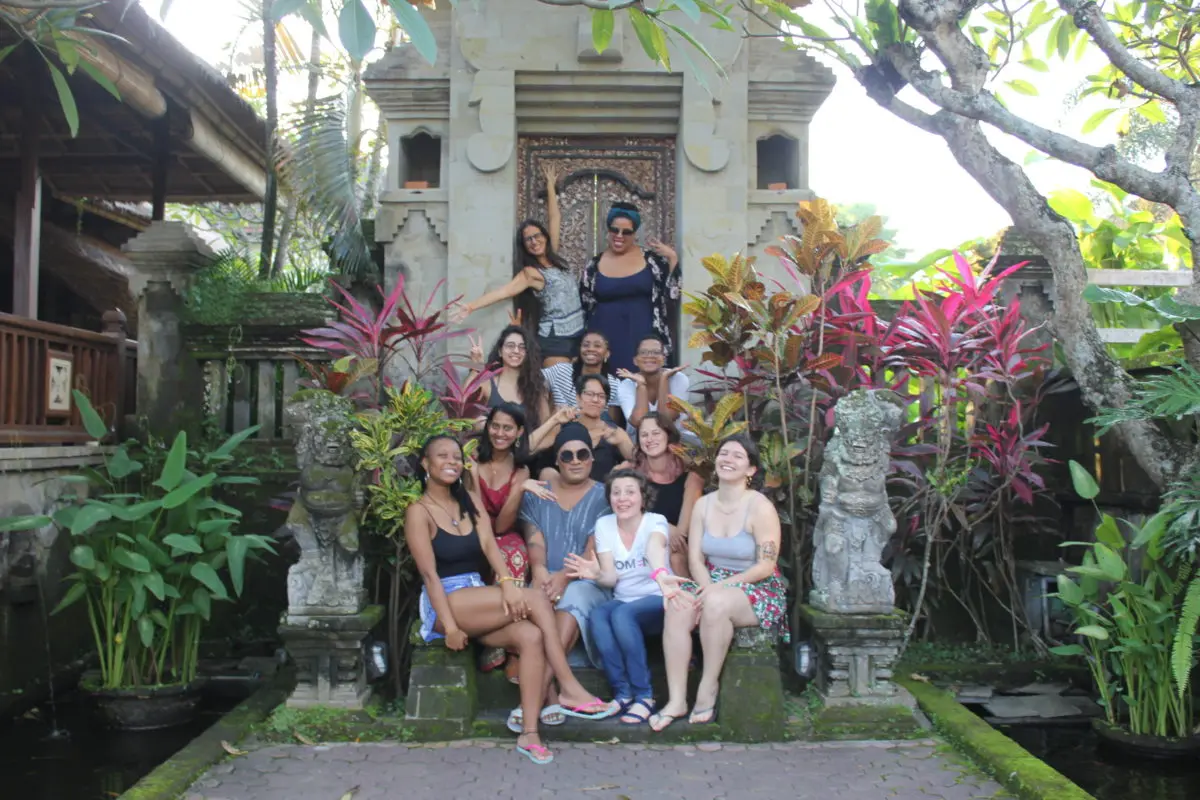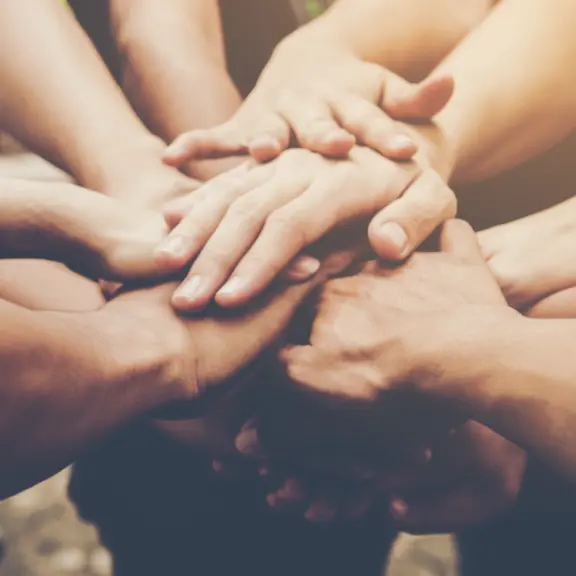
Braver strategies.
Bolder leadership.
Vision
Foundation for a Just Society envisions a world where all people are equally valued and lead self-determined lives.
Mission
Foundation for a Just Society advances the rights of women, girls, and LGBTQI people and supports gender and racial justice by ensuring those most affected by injustice have the resources they need to cultivate the leadership and solutions that transform our world.


How Change Happens
Foundation for a Just Society was founded on the belief that the liberation of women, girls, and LGBTQI people is an essential element of just societies. Change happens when people facing injustice come together to build a mutual understanding of their experiences, identify solutions that can solve a common problem, and collectively advocate for a shared vision. The most effective and enduring solutions are grounded in the lived experience of people who face the greatest injustice. Our work is guided by the principle that supporting organizations and movements that are led by these women, girls, and LGBTQI people is the best way to advance solutions that address root causes and ensure the essential dignity of all.
Values
Living up to our ideals is an ongoing process. We strive to do so through these core values:
Feminism
As the cornerstone for our work, our feminism is expansive, anti-racist, and provides a framework to understand and address the multiple injustices that shape the lives of women, girls, and LGBTQI people.
Center Those Most Affected by Injustice
When people who experience the deepest forms of oppression actively represent their own interests, the solutions are more effective and the progress is more enduring.
Collaboration
Because no individual, organization, or movement can defeat injustice alone, we cultivate relationships that are grounded in humility and reflect an optimism to work together to create a shared vision for transformation.
Risk
We commit to act boldly in support of activists and movements by breaking with conventional wisdom in philanthropy, engaging in experimentation, and learning from our failures and successes.
Trust
Our relationships are defined by integrity, transparency, reliability, and confidence in the leadership and visions of the women, girls, and LGBTQI people who face the greatest injustice.
Grantmaking Approach
Where do you work?
We make grants to local, national, regional, and global organizations and networks that advance the rights of women, girls, and LGBTQI people with an emphasis on Francophone West Africa, Mesoamerica, South and Southeast Asia, and the US Southeast. We also make a small number of grants in New York City.
What type of work do you support?
We support efforts that advance long-term, structural change and meet immediate needs that enable the women, girls, and LGBTQI people most affected by injustice to be leaders, strategists, and agents of change. We do not fund organizations that provide direct services without a vision for transformation.
Our grantmaking seeks to build power and common cause among women, girls, and LGBTQI people and support gender and racial justice. The decisions we make are guided by the leadership, values, strategies, and approaches within movements rather than a narrow understanding of single issues or quantifiable impact. We believe that solutions must be as sophisticated as the complex challenges they seek to address, and that deep and enduring transformation takes time.
What is a typical grant?
We prioritize multi-year, general operating support and avoid restrictions because organizations are able to work more strategically when they have the flexibility to recover from setbacks, seize opportunities, or shift tactics as needed. We avoid grant requirements that are needlessly complex or can exclude groups that are led by the women, girls, and LGBTQI people most affected by injustice.
In addition to grants, we provide our partners with an array of grantee-driven accompaniment that fosters organizational and movement strengthening to complement general operating grants. We place particular emphasis on accompaniment for strategic communications and holistic safety and collective care.
Do you fund unregistered groups?
Grants are made to organizations that are tax-exempt under section 501(c)(3) of the Internal Revenue Code in the United States or the equivalent in the country where the organization is based.
Who are your grantee partners?
The organizations we support have visionary leaders and reflect the ecosystem of gender and racial justice movements. These organizations are led by women, girls, and LGBTQI people who face the greatest injustice or clearly and intentionally center their priorities and agendas. Our grantee partners work at the local, national, regional, and global levels using a variety of strategies that include grassroots organizing, participatory grantmaking, strategic litigation, narrative change, safe spaces, and policy advocacy.
How do you select grantee partners?
Instead of reviewing unsolicited grant requests, we invite organizations to submit a proposal when we have reason to believe their work is aligned with our mission and strategies. This is a deliberate decision to ensure we are respectful of people’s time. We recognize that there are limitations in this approach. Our decisions are informed by the perspectives of our grantee partners and the priorities outlined in our strategies. We directly partner with organizations that are emerging and under the radar in addition to ones that are well-established and visible.
What do you not fund?
We generally do not fund:
- Individuals
- Educational scholarships
- Endowments or capital campaigns
- Partisan organizations or political parties
- Institutions that discriminate in policy or practice
What can grantee partners expect from FJS?
Our grantmaking is based on trust, transparency, and mutual accountability because we want visionary leaders to focus on changing the world, not meeting narrow grant mandates or easily measured results. Our role is to deeply listen to our grantee partners, be responsive to their feedback, and add value when we are uniquely equipped to do so. We take risks, encourage experimentation, and make room for failures that provide opportunities to learn and adapt.
We believe the process by which change is made is just as important as the results. We take the time to develop strong relationships that try to address the inherent power imbalance that exists between funders and grantee partners. In doing so, we are able to better understand the gaps in philanthropy, improve our approaches, and nurture practices that align with our vision and mission.
How do you work with other funders?
As a private foundation, we have a responsibility to advocate for more and better resources that promote the leadership, visions, and strategies of women, girls, and LGBTQI people who are most affected by injustice — including Black, Indigenous, ethnic minority, and lower caste women. We are committed to eliminating the mindsets and practices within philanthropy that prevent visionary leaders from accessing the resources they need to carry out approaches that are considered too experimental or unfamiliar to traditional funders. We aim to initiate and participate in conversations with our peers to encourage equity within philanthropy and expand resources for movements.
News + Stories

In Memory of Cohi Elyasaf (1967-2022)
She was a warm and welcoming presence to new staff, always had an encouraging word for her colleagues, and brought a clear head and curiosity to every challenge the organization faced. She will be dearly missed.

We Must Trust Young Feminists
Young feminists are leading systemic change through radical, creative, intersectional approaches while honoring ancestral knowledge and centering people and the planet – they deserve our trust. What would the world look like if we trusted the power and vision of young feminists?

Why We Must Overhaul the Funding of Social Movements
To adequately respond to the ongoing crisis of democracy, we must support care and protection strategies for activists.
